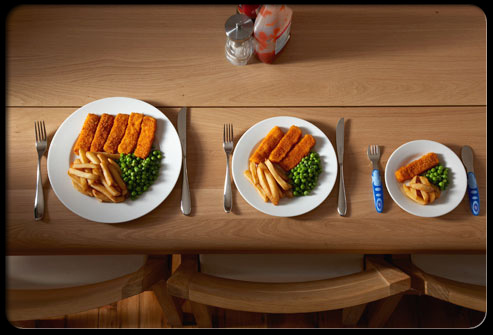It is well known that there has been a world-wide increase in obesity. It is no real surprise that the rise in obesity has been accompanied by an increase in portion sizes. People are eating more than they should without even realising it. They are eating bigger portions of food and are eating more of the high energy, pre-prepared foods that are high in sugar, fat and salt.
There are several reasons why our portions have become distorted in the past few years. People are eating out and buying fast foods more often. These meals are bigger than normal portion sizes, but generally eaten in full. To get value for money, people often buy snacks that are packaged in bigger than normal portion sizes and tend to ignore the recommended portion sizes stated on the packaging. Simply using larger plates and containers to serve foods can cause overeating. Most people have also lost those precious satiety (feeling of fullness) signals that they acquired during childhood and no longer know when they are satisfied, so continue to eat even though they are full.
Tips to Help with Portion Control:
-
Eat a variety of food at each meal, and try to include foods from at least two food groups at each meal.
-
Stick to regular meal times and eat small snacks if you feel hungry between meals.
-
Use smaller plates, containers, utensils, glasses and mugs that will make it look ‘fuller’.
-
Serve the correct portions of food onto individual plates, instead of putting serving dishes on the table.
-
Be aware that your body may only experience feeling ‘full’ sometime after eating your meal (usually about 20 minutes). Therefore, eat slowly, chew properly and pay attention to your body’s internal cues to avoid overeating. Eating in front of the TV generally leads to being distracted and not paying attention to signals of becoming ‘full’ thereby leading to overeating.
-
When eating out, share large portions or ask for a ‘doggie bag.
-
When eating or snacking in front of the TV, put a small amount in a bowl or container and put the rest away.
-
Never eat when standing in the kitchen, one loses track of how much one eats. Rather put the food on a plate and sit down at a table.
-
Snack foods that are bought in bulk should be portioned into individual-sized bags. Store large containers out of sight in a storage closet, cabinet, or garage.
-
Keeping excess food out of reach may discourage unintentional overeating. If you don’t buy it you won’t be tempted to eat it.
-
Keeping healthier foods within easy reach means you’ll be more likely to eat more of these foods. Place fruit in a large bowl on the counter and serve cut vegetables as the family arrives home from school or work.
-
Before grabbing a snack, ask yourself if you’re truly hungry or if you’re reacting to your thirst, emotions or eating out of habit. Eat less by not using food to cope or to distract you.
Feature by @futurelifeZA
 a
a







Tips On How To Control Your Portions and Lose Weight http://t.co/tJoeypwOjh